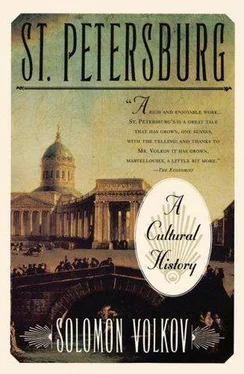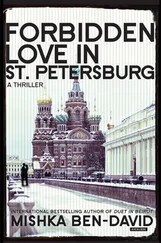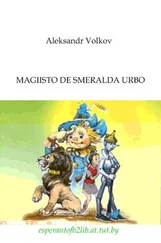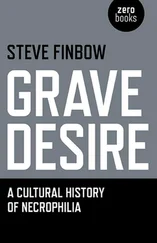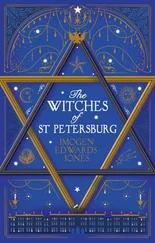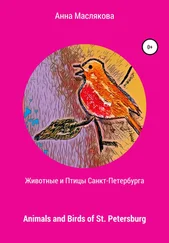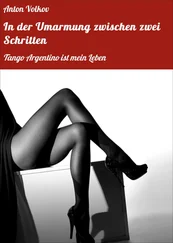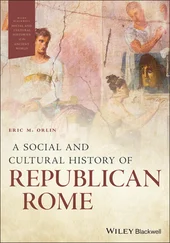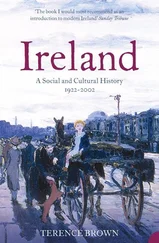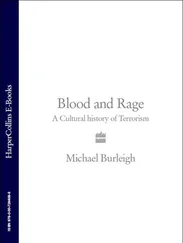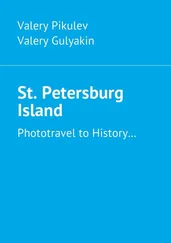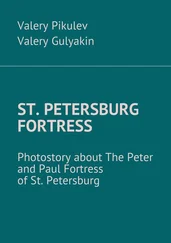Joseph Brodsky liked to say, “You cannot enter the same river twice, even if it is the Neva River.” In vain I whispered to myself a line from Mandelstam’s poem, “I have returned to my city, familiar to the point of tears.” I did not recognize the city; rather, I recognized it with difficulty, gradually—like a slowly developing photograph. Many years ago I had left Leningrad, where I had studied, fallen in love, played the violin, and started writing; now I had returned—albeit very briefly—to Saint Petersburg.
Yes, the changes were striking. There wasn’t a single state-owned store or café on the legendary Nevsky Prospect, and its glorious panorama brought the poems of Nikolai Zabolotsky to mind: “There the Nevsky is in glitter and dreariness, changing its skin in the night.” The street names familiar from my youth were gone—their original names had been reinstated. Now, ironically, the constructions, monuments, and heroes of the Soviet era were swiftly receding into history.
The city clearly wanted to part as quickly as possible from its recent humiliating existence, and a writer, yesterday a Leningrad and today a Petersburg writer, observed, “In moments of acute historical changes we fall under the influence of ideas, brilliant in their simplicity and obviousness—ideas of a symbolic revenge on the past. They brought Lenin into the Mausoleum —we will take him out; they blew up the church —we will build it again; they called the city their way and we will return its former name.” {7} 7 7 Peterburgskii zhurnal (Petersburg Journal), 1-2 (1993), p. 9.
Sometimes it seemed to me that the only constant of the city was its visual symbol, the Bronze Horseman, that only at its pedestal could I understand the multitude of doubts, questions, regrets, and recollections that assailed me. The physical and spiritual dynamism that animates this sculpture could lift the spirits of the most hidebound pessimist. The Bronze Horseman is in an eternal leap, connecting Petersburg soil with the Baltic sky above it.
For me the Bronze Horseman personified the vitality of the Petersburg mythos, its eternal ambivalence, its ascent to the heights of the human spirit, but also the constant threat—from without and within—to the equilibrium, to the very existence of that mythos. Before the Bronze Horseman you unwittingly forget about the zigzags of current politics, about economic problems, and are left alone with time, with the mythos that will live and thrive for a long time to come, I hope.
Here, at the foot of the statue, I recalled with gratitude all those—there were several hundred of them—whose testimony, stories, advice, materials, documents, and photographs helped me prepare this book. Particularly inspiring was my personal contact with the book’s four protagonists—Anna Akhmatova, George Balanchine, Dmitri Shostakovich, and Joseph Brodsky—who in the contemporary world stand as paragons of artistic, intellectual, and ethical standards. Meeting those artists shaped my life and was one of its greatest blessings. For each of those four giants, Petersburg always remained the leading creative symbol and impulse, and each has inimitably played a pivotal role in the creation of the new Petersburg mythos.
I want also to name here some of my interlocutors and correspondents over the last three decades, both in Russia and in the West, many of whom are major figures in Petersburg and Russian culture. They are Iogann Admoni, Nikolai Akimov, Grigory Alexandrov, Nathan Altman, Boris Arapov, Leo Arnshtam, Gennady Banshchikov, Alexander Beniaminov, Olga Berggolts, Andrei Bitov, Valerian Bogdanov-Berezovsky, Isaiah Braudo, Lili Brik, Nina Bruni-Balmont, Semyon Bychkov, Mihail Chemiakin, Alexandra Danilova, Anatoly Dmitriev, Leonid Dolgopolov, Sergei Dovlatov, Sofia Dubnova, Mikhail Dudin, Orest Evlakhov, Kurt Fridrikhson, Valery Gavrilin, Valery Gergiev, Tamara Geva, Evdokia Glebova, Gleb Gorbovsky, Lazar Gozman, Irina Graham, Daniil Granin, Boris Grebenshikov, Yuri Grigorovich, Lev Gumilyov, Pavel Gusev, Vladimir Horowitz, Anatoly Kaplan, Vasily Katanyan, Aram Khachaturyan, Nikolai Khardzhiev, Andrei Khrzhanovsky, Alexander Knaifel, Georgy Kocheyitsky, Yuri Kochnev, Leonid Kogan, Kirill Kondrashin, Maria Konisskaya, Zinovy Korogodsky, Gidon Kremer, Alexander Kushner, Konstantin Kuzminsky, Viktor Liberman, Fyodor Lopukhov, Lev Loseff, Berthe Malko, Mikhail Matveyev, Yakov Milkis, Nathan Milstein, Alexander Mintz, Yevgeny Mravinsky, Anatoly Nayman, Ernst Neizvestny, Yevgeny Nesterenko, Rudolf Nureyev, David Oistrakh, Alexandra Orlova, Boris Paramonov, Nadezhda Pavlovich, Maya Plisetskaya, Boris Pokrovsky, David Pritsker, Lina Prokofiev, Lev Raaben, Rita Rait, Yevgeny Rein, Mstislav Rostropovich, Gennady Rozhdestvensky, Vadim Salmanov, Dmitri Shagin, Marietta Shaginyan, Veniamin Sher, Vladimir Shinkarev, Viktor Shklovsky, Maxim Shostakovich, Iosif Shvarts, Sergei Sigitov, Yuri Simonov, Sergei Slonimsky, Gennady Smakov, Arnold Sokhor, Vladimir Solovyev, Viktor Sosnora, Vladimir Spivakov, Vera Stravinsky, Georgy Sviridov, Alexander Tcherepnine, Yuri Temirkanov, Boris Tishchenko, Alexander Tyshler, Yulian Vainkop, Mikhail Verbov, Pavel Vulfius, Leonid Yakobson, Roman Yakobson, Mariss Yansons, Maria Yudina, Sergei Yursky, Sergei Yutkevich, Vyacheslav Zavalishin, Kurt Zanderling, Irina Zegzhda, Lydia Zhukova, and Yevgeny Zubkov. I am forever grateful to them for their attention, forbearance, responsiveness, and patience.
Some aspects of my work I also discussed with Peter Vail, Alexander Genis, Roman Timenchik, Lazar Fleishman, and Mikhail Yampolsky. These consultations were of great help.
I thank Adam Bellow and Loretta Denner for their wholehearted support of this project, and my wife, Marianna, for her enormous help as a researcher and photographer.
In 1922 a book was published in Petrograd, The Soul of Petersburg, by Nikolai Antsiferov, a pioneering student of local lore. The author, unlike traditional travel guide writers, did not dwell on dates and details but concentrated instead on the genius loci of Petersburg, a city of “tragic imperialism,” as he put it. Antsiferov’s vivid Soul of Petersburg was the work not of an academic observer with pretensions to covering everything and being “objective,” but a passionate testimony of a participant in Petersburg’s tragedy. Antsiferov’s own fate was unhappy (he was arrested and exiled several times), as was that of his book, which was suppressed soon after publication and reprinted only seventy years later. A precious first edition is one of the items dearest to my heart in my private library.
Another important creative stimulus and model for me was the work of several art and music critics, who worked in Petersburg-Petrograd in the first decades of the twentieth century. Alexander Benois, Nikolai Punin, and Igor Glebov (the pseudonym of Boris Asafyev) were very popular in their time; they were published in high-brow journals and mass circulation newspapers, playing a dual and equally outstanding role—as creators of revolutionary concepts of modern culture and as its influential interpreters for the Russian educated classes. Their contribution to the comprehension of the city’s grandeur and mystical significance is invaluable. For many decades their most perceptive works were deemed too controversial for Soviet readers and were not reprinted. Only now are they coming out of the shadows. Their passionate desire to enlighten their audience, to make available the highest achievements of the human spirit, in conjunction with their erudition and cosmopolitanism, makes these authors timely and necessary today in Petersburg.
My book is to a great degree a tribute to these writers. In addition, for the more than seven years needed to complete my work, a constant source of intellectual sustenance was James H. Billington’s interpretative study of the development of Russian culture, The Icon and the Axe. Reading it strengthened me in my resolve to write this book, not as an encyclopedia of Petersburg culture but as an elaborated conceptual history of the development, over several centuries, of the Petersburg legend and the Petersburg mythos.
Читать дальше
